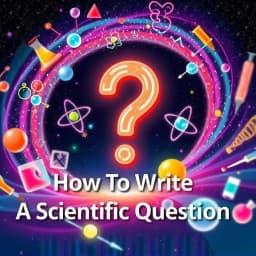
How to Write a Scientific Question
Find this useful? Bookmark ( CTRL/CMD + D ) for quick access!
Try an example:
Research Proposal Development
Student Science Projects
Grant Application Questions
Experimental Design Queries
Literature Review Questions
Interdisciplinary Research Topics
Explore Similar Tools
Recent Generations
Taco Bar Party Ideas
the amount paid directly to you. Yes it is possible in future cases to request direct payment to the provider, Rephrase and give me polished email.
Claim Email Template
we have processed the claim as per the attachments in the claim submission we have processedthe invoice for Saul Holding. We dont have invoice for the Salofalk.
Claim Email Template
this additional information is very important. this adiitional information was requested by our clinical team. Without clinical review claim not be paid so please share the below additional information
How To Write A Scientific Question
How To Write A Scientific Question is a powerful AI-powered tool designed to assist users in formulating precise and impactful scientific questions. This innovative solution combines advanced natural language processing with a user-friendly interface to deliver a seamless experience for researchers, students, and educators alike.
Key Capabilities
- Guided Question Formulation: Generate clear and concise scientific questions tailored to your research topic, enhancing clarity and focus.
- Customizable Templates: Utilize a variety of templates that cater to different scientific disciplines, ensuring relevance and specificity in your inquiries.
- Feedback Mechanism: Receive instant feedback on your questions, allowing for iterative improvement and refinement to meet academic standards.
- Resource Integration: Access a library of scientific resources and examples to inspire and inform your question development process.
Who It's For
Designed for students, researchers, and educators, How To Write A Scientific Question excels in academic settings and research environments. Whether you're crafting questions for a thesis, preparing for a lab experiment, or teaching scientific inquiry, this tool streamlines your workflow and enhances productivity.
Why Choose How To Write A Scientific Question
What sets How To Write A Scientific Question apart is its intuitive design and comprehensive support, making it the ideal solution for anyone looking to elevate their scientific inquiry skills and produce high-quality research questions.
Ready to transform your scientific inquiry process? Start using How To Write A Scientific Question today and experience the difference in your research and learning journey!
Enhance Your Work with How to Write a Scientific Question
Leverage the power of AI to streamline your tasks with our How to Write a Scientific Question tool.
Guided Question Formulation
Step-by-step guidance to help you formulate precise and relevant scientific questions.
Research Integration
Access a database of existing research to ensure your question is unique and impactful.
Feedback Mechanism
Receive instant feedback on your question's clarity and relevance from the AI tool.
How How to Write a Scientific Question Works
Discover the simple process of using How to Write a Scientific Question to improve your workflow:
Identify Your Topic
Begin by selecting a broad area of interest in science that you want to explore.
Formulate a Question
Narrow down your topic to create a specific, researchable question that guides your inquiry.
Research Background Information
Gather existing literature and data related to your question to understand the context and significance.
Refine Your Question
Revise your question based on your research to ensure it is clear, focused, and feasible for investigation.
Use Cases of
How to Write a Scientific Question
Explore the various applications of How to Write a Scientific Question in different scenarios:
Formulating Research Hypotheses
Assist researchers in developing clear and testable hypotheses based on their scientific interests and existing literature.
Educational Support for Students
Guide students in crafting precise scientific questions for their projects, enhancing their understanding of the scientific method.
Enhancing Grant Proposals
Help researchers articulate compelling scientific questions that can strengthen their grant applications and proposals.
Facilitating Collaborative Research
Aid interdisciplinary teams in aligning their research objectives by generating focused scientific questions that bridge different fields.
Who Benefits from How to Write a Scientific Question?
AI-Powered Efficiency
From individuals to large organizations, see who can leverage How to Write a Scientific Question for improved productivity:
Students
Learn how to formulate precise scientific questions to enhance research skills.
Researchers
Develop clear and focused research questions to guide scientific investigations.
Educators
Equip students with the tools to create effective scientific inquiries in the classroom.
Policy Makers
Formulate evidence-based questions to address societal challenges and inform policy decisions.
Frequently Asked Questions
What is the purpose of the 'How To Write A Scientific Question' tool?
The tool is designed to help users formulate clear, focused, and researchable scientific questions, which are essential for conducting effective scientific investigations.
Who can benefit from using this tool?
Students, researchers, educators, and anyone involved in scientific inquiry can benefit from this tool, as it aids in developing strong foundational questions for their research.
Is there a specific format I should follow when using the tool?
While the tool provides guidance on structuring scientific questions, users are encouraged to adapt the suggestions to fit their specific research context and objectives.
Can the tool help with questions in any scientific discipline?
Yes, the tool is versatile and can assist with formulating questions across various scientific disciplines, including biology, chemistry, physics, and social sciences.
Is there a cost associated with using the 'How To Write A Scientific Question' tool?
The tool is currently offered for free, allowing users to access its features without any financial commitment. Future premium features may be introduced, but basic functionalities will remain free.
































